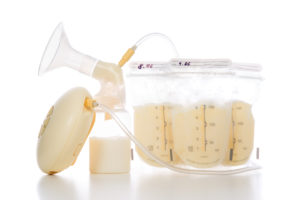As breastfeeding moms, we sometimes doubt our body’s ability to produce the amount of milk that our baby needs to thrive, and many false alarms start to go of in our heads. We are constantly second guessing ourselves, analyzing symptoms such as softer breasts, decreased output from the pump and making enough breast milk, often creating anxiety.

Did you know that there is a medical term for the belief that you aren’t making enough breast milk? It is called “perceived insufficient milk,” and it is extremely common amongst breastfeeding moms.
What, exactly, makes a mom think that she isn’t producing enough? Are there certain red flags in her mind that prompt these fears? You might be surprised to discover that the answer is a resounding yes! There are typical factors that cause moms to question their supply and output. Read on to discover what they are, as well as why moms shouldn’t assume that these “false alarms” are due to a low supply.
- Increased Breast Softness/Feeling Empty

Many moms will tell you that they thought their milk supply plummeted because their breasts didn’t feel as heavy or firm as they did in the early days of breastfeeding. However, our bodies are made to adjust to the milk we make. It is common for our breasts to regulate after our mature milk comes in, and it does not indicate a supply issue. - Lack of Leaking or Let Down Sensation
Many moms think that just because they don’t experience the feeling of a let down or leaking breasts, they aren’t producing enough milk. Every mother’s body is different – just because a nursing mother is leaking, doesn’t mean she has a large supply. Likewise, just because a nursing mother is not leaking doesn’t mean that her supply is inadequate. - Volume Pumped
You might have heard the expression that the baby is more efficient than the pump, which is true! Nursing moms will respond differently to each pump, and there are many factors that determine your pumping output.
The volume of breast milk you pump is never a clear indicator of how much breast milk you produce, in facts it can be only 30% of what your breast actually has. This should not be an indicator of a potentially low supply.
- Frequent Feeding
If you find that your baby is wanting to nurse more frequently, this does not mean that you aren’t producing enough milk for him or her. Babies will feed more frequently for many reasons, one of which is that the baby is experiencing a typical growth spurt. Your milk changes its nutritional content depending on the time of day, too. Remember that your baby’s stomach is the size of his or her fist, and breastmilk is digested very quickly! It’s normal for your baby to be hungry again every shortly after they ate. - Fussiness at the Breast. Especially in the early days, there are many reasons why your baby will be fussy. Though it’s true that fussiness at the breast could indicate a lack of satisfaction, there are also many other factors that contribute to this behavior.

Baby can become fussy at the breast for many different reasons They are worth looking into before pointing fingers at your milk supply.
- Growth Plateau
Though your baby grows rapidly during those first few months of life, his or her growth will decrease as time passes. This is a baby’s normal pattern and is in no way related to your milk supply.
Remember that just because a mom experiences one of these common “false alarms” does not mean that she has a trouble with a low milk supply. Babies are fascinating creatures, and their needs and temperaments are constantly evolving, especially during the first year of life. It’s always a good idea to go by the number of wet and dirty diapers your baby is producing, as well as to follow his or her growth curve from your pediatrician appointments. If you are having any doubts, be sure to seek help from a certified lactation consultant who can troubleshoot any issues with you.








